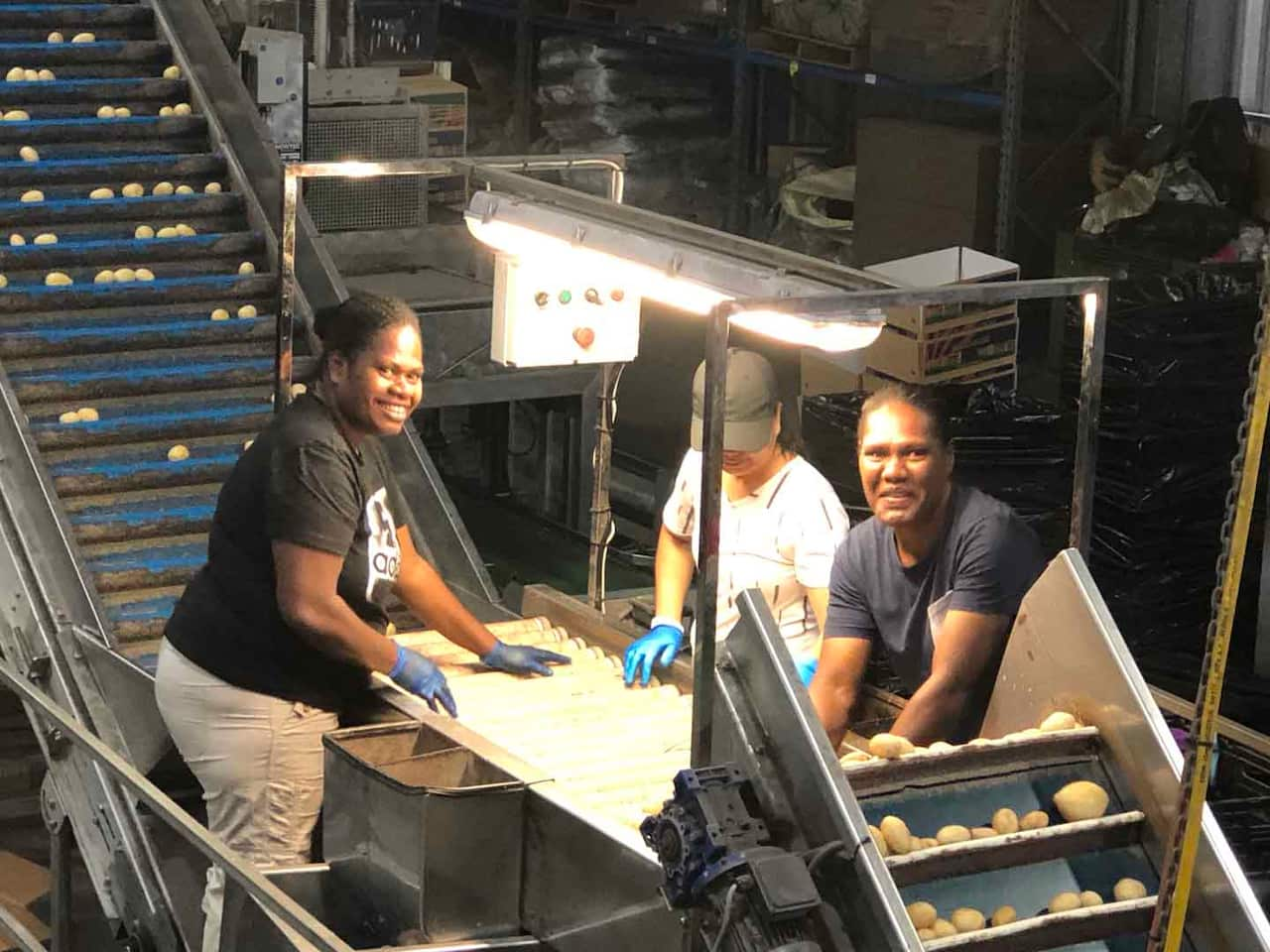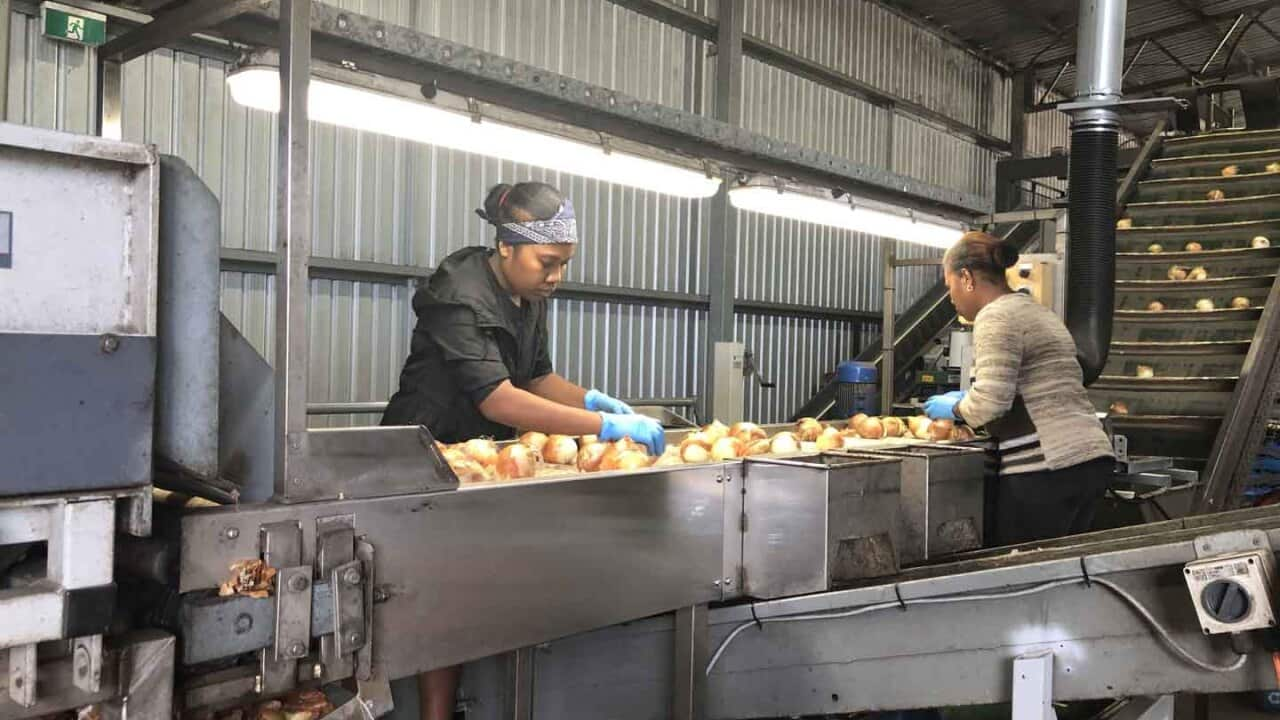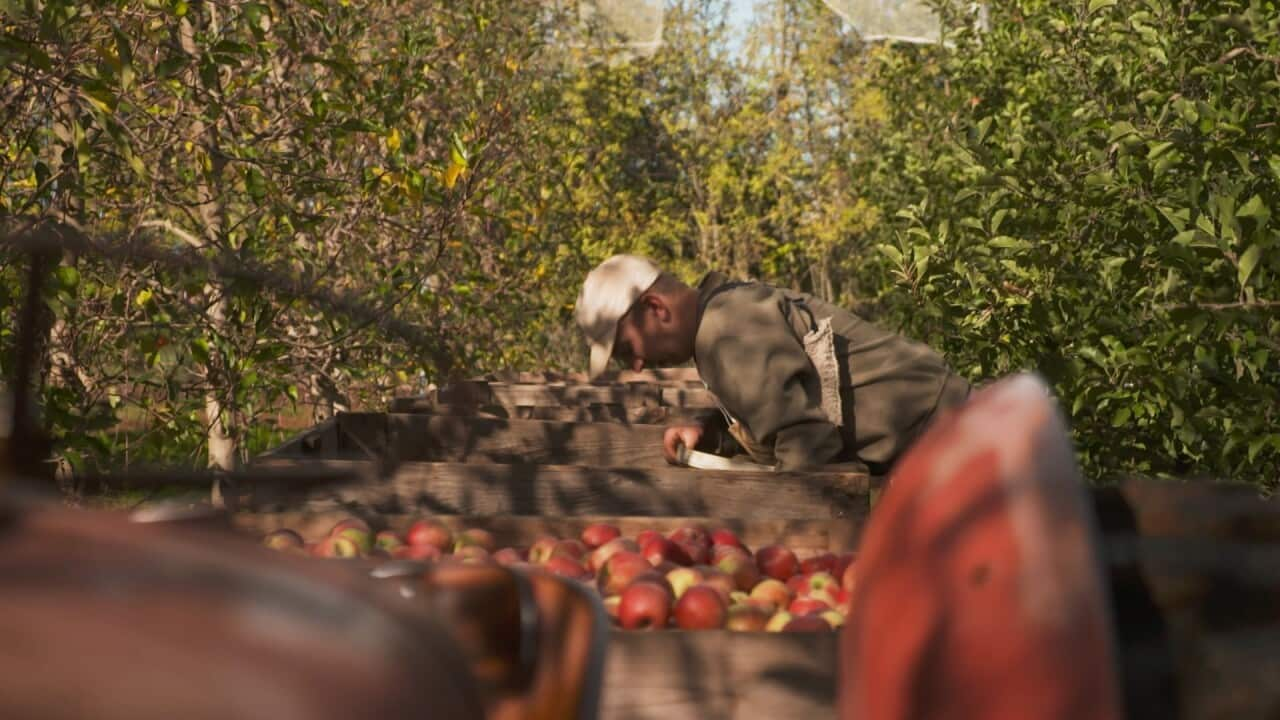Watch Pandemic Farming: Apples and Oranges on SBS On Demand
An archipelago of picturesque islands in the south-western Pacific Ocean, Vanuatu has only had of COVID-19 to date. But for a country heavily reliant on tourism, the pandemic has hit the local economy hard, with many of the ni-Vanuatu people reliant on the tourism industry for their work and livelihoods.
Ni-Vanuatu commercial painter Mark Hoya is originally from the Island of Ambrym but has lived in Port Vila for the last fifteen years, as he supports his family. He has experienced several stints without work in the last year as a result of the impact of the pandemic, “It has been hard for me to find work for the last 12 months”, he said, translated from the local Bislama language.
“Plenty of people in Vanuatu are finding it hard to find work”, said Mr Hoya, as he explained that with little work in town, many ni-Vanuatu have been leaving the capital to return to their home islands where it is easier to live. “Food is free” he said. Others have looked further afield to support their families.
The opportunity to travel internationally for seasonal work is a big deal for many ni-Vanuatu, and it is often their first time outside of Vanuatu. The ni-Vanuatu have a saying in the local Bislama language, ‘Go finisem tingting blong you’, which translates as ‘go and do what you have been planning and dreaming of doing’. Travelling internationally for seasonal work is all the more a big deal now with the pandemic, as not only are those who do get the chance to travel appreciative of the work, but there’s also the added burden of leaving behind family during a time of global upheaval and uncertainty.
Travelling internationally for seasonal work is all the more a big deal now with the pandemic, as not only are those who do get the chance to travel appreciative of the work, but there’s also the added burden of leaving behind family during a time of global upheaval and uncertainty.

Ni-Vanuatu commercial painter Mark Hoya. Source: Supplied
For those ni-Vanuatu desperate for work and hoping to go overseas it all starts with queues outside the police station or local church as people seek a police clearance, the first step to be able to apply for possible seasonal work internationally in countries like Australia.
Many ni-Vanuatu seasonal workers who travel to Australia for work, have come directly from the outer islands of Vanuatu, and so the money they earn in Australia ends up back in the islands and small villages, allowing their ni-Vanuatu families there to build houses and buy fishing boats, securing a future for both the inhabitants and their way of life.
The relationship is more than mutually beneficial. There is a significant need for seasonal farmworkers in Australia, with the pandemic impacting farmers across the nation due to a reduction in the normal numbers of international backpackers who traditionally have filled a large proportion of the seasonal workforce.
As John Shannon, CEO of industry group vegetablesWA explained, one important solution has seen both the Commonwealth and State Government’s work with industry groups and growers to enable international workers from countries like Vanuatu to enter Australia during the pandemic, to be able to help farmers harvest seasonal produce.
“We’ve only had an initial two flights arrive, and we’ll be working with the Government in the future to organise additional flights, bearing in mind that the numbers of workers that we’re able to access through this visa scheme falls very much short of the numbers of overseas workers we’d typically have access to,” he said.
In the days before Christmas 2020, 154 ni-Vanuatu workers arrived in Western Australia and undertook the mandatory 14-day quarantine period. A second plane with 160 ni-Vanuatu workers arrived in early January 2021, departing quarantine in late January. The workers have since travelled to farms across the state, working on farms around the towns of Gingin, Pinjarra, Myalup, Harvey, Mt Barker, Pemberton, Manjimup, Katanning and Narrogin. WA was not the first state or territory to receive ni-Vanuatu workers, with two plane-loads having arrived into the Northern Territory to fill a labour shortfall there. The arrival of the international workers has provided a glimmer of hope for local producers, for what has been a challenging past year. Brassica grower Graham Rose from Rose Farms WA at Myalup, about 140 kilometres south of Perth, currently has 30 ni-Vanuatu workers on his farm picking broccolini.
The arrival of the international workers has provided a glimmer of hope for local producers, for what has been a challenging past year. Brassica grower Graham Rose from Rose Farms WA at Myalup, about 140 kilometres south of Perth, currently has 30 ni-Vanuatu workers on his farm picking broccolini.

ni-Vanuatu workers assisting with produce sorting and packing. Source: vegetablesWA
“Our Vanuatu workers are exceptional. – we wouldn’t be here, full stop. With our broccolini, we work six days a week – and of those six days we pick every day and we pack every day. Since the Vanuatu workers arrival, we’ve been busy training the team – and it’s been flat out for the past three or so weeks.
"Their enthusiasm and focus run rings around an Australian worker!
“They come from a different culture and background, and they come here to work – to support themselves and their families back home, so their families rely on them coming here and working. They’re honest, respectful and conscientious,” said Mr Rose.
The ni-Vanuatu workers on Rose Farms WA have committed to a nine-month contract, and Mr Rose said the team are fresh, keen to work, and are already making a huge difference amidst the underlying backdrop of the uncertainty of the pandemic.
“With the pandemic and being away from their families, it doesn’t have a bearing on them because they’re a new intake – but like any normal person, if they’re homesick or missing family connections – that’s just a normal feeling and they’ve all come here to work.
“From our side, having been through the uncertainty of labour shortages and having to previously plough back in a percentage of our crops, we’re now starting to ramp up our productivity –and right now we’re just starting to get on top of picking the full amount that’s available, and we’re ramping up from here on in because we’ve got the workers now,” said Mr Rose.
In mid-December 2020, the National Farmers Federation launched their National Lost Crop Register to capture the cost to industry and the national economy of the lack of seasonal workers available to harvest fresh fruits and vegetables. By early February the crop losses related to the ongoing labour shortages had exceeded .
According to from the Australian Bureau of Agricultural and Resource Economics and Sciences (ABARES), the reduction in the availability of overseas labour is driving a fall in horticultural produce production and an associated rise in produce prices in 2020-21. The prices of summer vegetables, stone fruit, pome fruit and table grapes are forecast to rise by between 15 per cent and 25 per cent. For producers in Western Australia, the arrival of the ni-Vanuatu workers has provided salvation, and added a sense of positivity to the year ahead.
For producers in Western Australia, the arrival of the ni-Vanuatu workers has provided salvation, and added a sense of positivity to the year ahead.

ni-Vanuatu workers working in the farm. Source: vegetablesWA
“It’s been highly successful, we have heard wonderful reports from the growers who are accessing these workers from Vanuatu. West Australian vegetable growers are seeing a significant shortfall in the number of workers that they have available, whilst many growers have employed additional Australians, the reduction in the numbers of backpackers has significantly reduced over the course of the pandemic – and being able to access workers from Vanuatu goes some small way towards replacing the shortfall,” said John Shannon from vegetablesWA.
Phil Tucak is a Perth-based journalist and former WA Correspondent for SBS News and Living Black.



